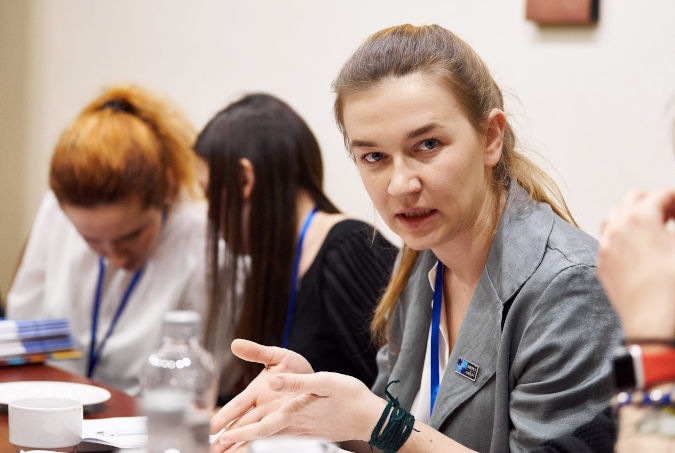In the words of Andriana Susak-Arekhta: “Only I get to decide what my life should be. I was born free, I am free, and I will die free”
Date:

A military veteran and civil society activist Andriana Susak-Arekhta, 31, from Ukraine, reveals the emergence of the women’s veteran movement in Ukraine. Born in Kosiv, Western Ukraine, she participated in the Revolution of Dignity in Ukraine. In 2014, she joined the Armed Forces of Ukraine as a volunteer and was a ground attack trooper with the rank of junior sergeant. Known as the “People’s Hero of Ukraine” and the “Cavalier of the Order of Courage,” Andriana is an advocate for women’s rights in the military and involved in the women’s veteran movement. An expert at the Institute for Gender Programs in Kyiv, she discusses with us the Beijing+25 topic, women and conflict.
“In my family, no one ever told me that I couldn’t achieve something simply because I’m a girl. But in post-Soviet society, the accepted stereotype dictates that being a woman means doing domestic work and taking care of family. In my hometown, I saw girls enter university and then drop out to marry and have kids. Even if they received a diploma of higher education, they did not use it and focused entirely on domestic work and family.
In rural areas, no one talks about self-fulfillment. They only talk about successful marriage. I am not against a woman’s desire to raise a family, but I am completely against the social stereotypes that prescribe that path as the only plausible one for a woman.
Everyone enters this world free and unique, equal in rights to live happily and to fulfill themselves. Why then are there still so many gender stereotypes, discriminatory practices and prejudices, and gender-based violence against women and girls? Women make up more than half of the world’s population, but they are not allowed to make decisions on what this world should be. This is why Beijing Declaration and Platform for Action is an historic roadmap for building a world free from violence and discrimination, where every woman and girl has an opportunity to be heard and become who she wants.
I ran into gender stereotypes when choosing after-school activities, my profession, and even the way I dress. When a conflict in Ukraine began in 2014, women volunteered for military services alongside men to protect the territorial integrity and independence in the Eastern part of Ukraine. The harsh reality of stereotypes hit me. I was told, “The army is a man’s world” and “Women have no place in war.” If I’m a part of professional military personnel, if I perform my duties, not any worse and sometimes better than men, why am I not allowed to defend my country?
The law back then did not allow women in active combat positions, or to receive decent financial support or social benefits for such work. But Ukrainian women have demonstrated that they have a place in war, they perform their functions, and the army is a professional unit of state defense which unites professionals regardless of their gender. Thanks to the civil society demand and government cooperation, a strategic step towards gender equality in the security sector was taken. Almost all combat positions are now open for girls in the Armed Forces, and all National Guard positions are available for women. A leading military school, the Ivan Bohun Kyiv Military Lyceum, now admits girls.
My message today is that I am a granddaughter, a daughter, a wife, a mom, a “sister” in arms, an activist, a combatant, a veteran – I am life, and only I get to decide what my life should be. I was born free, I am free, and I will die free.

This story is part of the regional media campaign “12 voices. 12 journeys. 12 women from 12 Europe and Central Asia countries”. Passionate about gender equality and women`s rights, explore aspects of the 12 critical areas of the Beijing Platform for Action: poverty; education and training; health; violence; armed conflict; economy; power and decision-making; institutional mechanisms; human rights; media; environment; and the girl child. On the eve of 2020 and the 25th anniversary of the 1995 Beijing Declaration and Platform for Action, these 12 women are reimagining economies, societies and political systems to achieve gender equality. Imagine a world where gender equality is the norm. These women do.